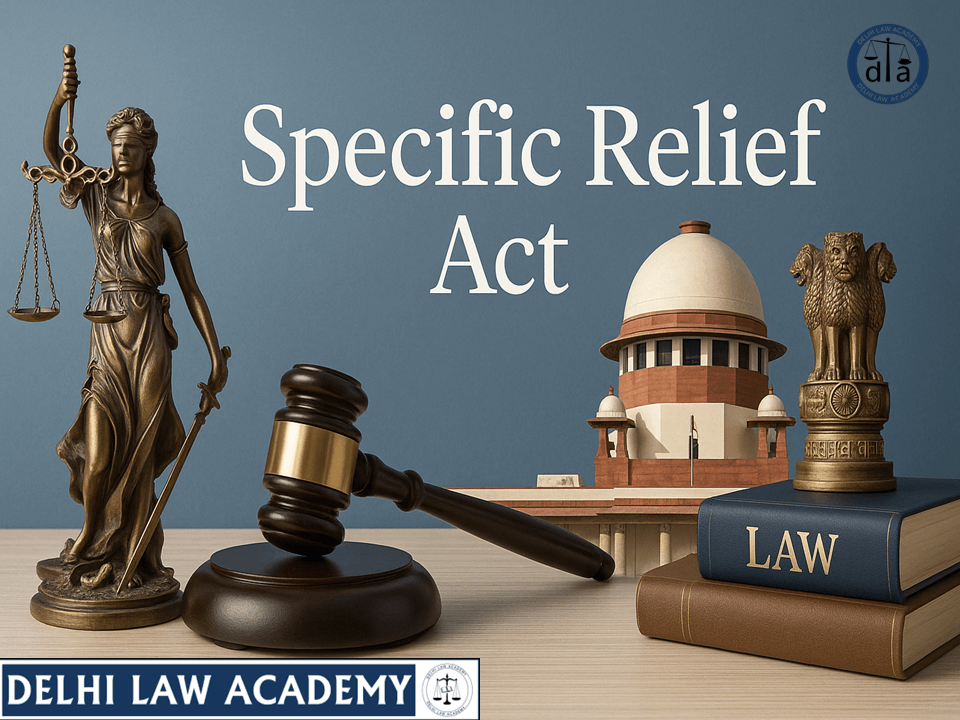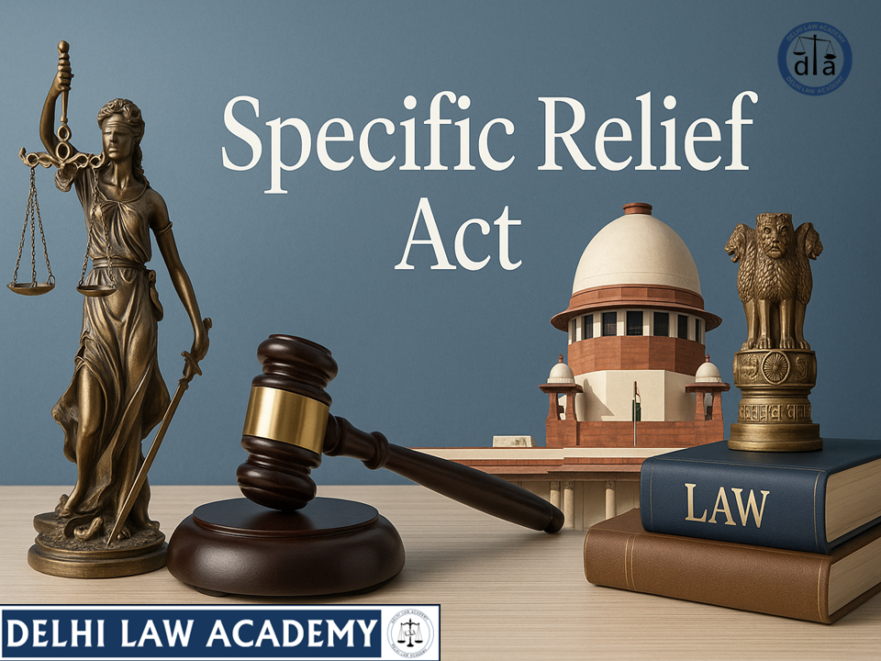
⚖️ SPECIFIC RELIEF ACT : SECTIONS 10 AND 12
📘 EFFECT OF 2018 AMENDMENT
- After the 2018 amendment, specific performance, which stood as a discretionary remedy, is codified as an enforceable right which is not dependent anymore on equitable principles.
Question
- Whether the amended Section 10 of the Specific Relief Act is prospective or retrospective in operation?
🏛️ Supreme Court in Katta Sujatha Reddy v. Siddamsetty Infra Projects
- Since the 2018 amendment was not a mere procedural enactment, rather it had substantive principles built into its working, it would apply prospectively.
📚 Supreme Court judgments considered in this post:
- Jaswinder Kaur v. Gurmeet Singh [2017 SC]
- Rachakonda Narayana v. Ponthala Parvathamma [2001 SC]
- Katta Sujatha Reddy v. Siddamsetty Infra Projects
🧑⚖️ Preparation for RJS, DJS, PCS(J) and other Judicial Service exams
📘 SPECIFIC RELIEF ACT EXPLAINED
The Specific Relief Act is an important component of any and every Judicial Service exam in the country. Its thorough knowledge is a must for all aspirants of RJS, DJS, PCS (J) and every other Judicial Service exam. To help such aspirants, DELHI LAW ACADEMY JAIPUR has launched a series of study material modules on all important aspects of this important part of their syllabus:
📜 Section 10 — Specific performance in respect of contracts
[As amended by the Amendment Act 2018, which came into force on 1.10.2018]
- Specific performance of a contract shall be enforced by the court
- Subject to provisions of sections 11(2), 14 and 16
📖 DLA Note on Applicability of Section 10
After the 2018 amendment, specific performance, which stood as a discretionary remedy, is codified as an enforceable right which is not dependent anymore on equitable principles expounded by judges, rather it is founded on satisfaction of the requisite ingredients as provided under the Specific Relief Act.
The amendment carried out in 2018 was enacted to further bolster adherence to the sanctity of contracts. This approach was radical and created new rights and obligations which did not exist prior to such an amendment.
This provision, which remained in the realm of the Courts’ discretion, was converted into a mandatory provision, prescribing a power the Courts had to exercise when the ingredients were fulfilled.
This was a significant step in the growth of commercial law as the sanctity of contracts was reinforced with parties having to comply with contracts and thereby reducing efficient breaches.
Under the pre-amended Specific Relief Act, one of the major considerations for grant of specific performance was the adequacy of damages under Section 14(1)(a). However, this consideration has now been completely done away with, in order to provide better compensation to the aggrieved party in the form of specific performance.
❓ Question:
- Whether the amended Section 10 of the Specific Relief Act is prospective or retrospective in operation?
✅ Ans:
- Since the 2018 amendment was not a mere procedural enactment, rather it had substantive principles built into its working, it would apply prospectively.
- The amendment act contemplates that the said substituted provisions would come into force on such date as the Central Govt may appoint.
- Since the 2018 amendment to the Specific Relief Act is prospective it cannot apply to those transactions that took place prior to its coming into force.
Authority: Supreme Court in August 2022 in Katta Sujatha Reddy v. Siddamsetty Infra Projects
⚖️ Section 12 Specific Relief Act | Specific Performance of Part of Contract
📘 Section 12(1) — Specific performance of part of contract
Except as otherwise provided in this section: court shall not direct specific performance of a part of a contract.
📘 Section 12(2)
Where a party to a contract is unable to perform the whole of his part but the part which must be left unperformed be only a small proportion to the whole in value and admits of compensation in money… court may at suit of either party direct specific performance of so much of the contract as can be performed and award compensation in money for the deficiency.
📘 Section 12(3)
Where a party to a contract is unable to perform the whole of his part of it and the part which must be left unperformed either— forms a considerable part of the whole, though admitting of compensation in money or does not admit of compensation in money he is not entitled to obtain a decree for specific performance but the court may, at the suit of the other party, direct the party in default to perform specifically so much of his part of the contract as he can perform, if the other party:
- (i) pays or has paid the agreed consideration for the whole of the contract reduced by the consideration for the part which must be left unperformed, in a case falling under clause (a)
- pays or has paid the consideration for the whole of the contract without any abatement, in a case falling under clause (b)
- (ii) in either case, relinquishes all claims to the performance of the remaining part of the contract and all right to compensation, either for the deficiency or for the loss or damage sustained by him through the default of the defendant.
📘 Section 12(4)
When a part of a contract which can and ought to be specifically performed stands on a separate and independent footing from another part of the same contract which cannot be specifically performed, court may direct specific performance of the former part.
💡 Explanation
A party to a contract shall be deemed to be unable to perform the whole of his part of it if a portion of its subject-matter existing at the date of the contract has ceased to exist at the time of its performance.
📘 DLA Note on Applicability of Section 12
The expression “unable to perform” in Section 12(2) would mean that a part of the property destroyed after contract or act of God or an act by which it would cease to exist. In such a case party to a contract shall be deemed to be unable to perform the whole or its part of the contract. Such a person would come within the words “party in default”.
The inability to perform may arise by deficiency in quantity of subject¬matter or deficiencies or some legal prohibition or such other causes.
Section 12 of the Act does not apply where the inability to perform specific performance on part of contract arises because of the plaintiff’s own conduct.
The Explanation in the section exhausts all the circumstances in which part¬performance can be granted.
A perusal of Section 12(3) shows that the first part of the said provisions mandates refusal of specific performance of a contract on certain conditions. However, the latter part permits a court to direct the party in default to perform specifically so much of his part of the contract as he can perform if the other party pays or has paid the agreed consideration for the whole of the contract and relinquishes all claims to the performance of the remaining part of the contract and all the rights to compensation for the loss sustained by him.
If a suit is laid by the other party, the court may direct the defaulting party to perform that part of the contract which is performable on satisfying two preconditions: the plaintiff pays or has already paid the whole of the consideration amount under the agreement, and that the plaintiff relinquishes all claims to the performance of the other part of the contract which the defaulting party is incapable to perform and all rights to compensation for loss sustained by him.
Thus, the ingredients which would attract specific performance of the part of the contract are: if a party to an agreement is unable to perform a part of the contract, he is to be treated as defaulting party to that extent and the other party to an agreement must, in a suit for such specific performance, either pay or has paid the whole of the agreed amount, for that part of the contract which is capable of being performed by the defaulting party and also relinquish his claim in respect of the other part of the contract which the defaulting party is not capable to perform and relinquishes the claim of compensation in respect of loss sustained by him.
If such ingredients are satisfied, the discretionary relief of specific performance is ordinarily granted unless there is delay or laches or any other disability on the part of the other party.
📚 Continue Your Specific Relief Act Preparation
Don’t stop here! Strengthen your knowledge of the SRA with our other fully solved tests:
📘 Free Study Material for Judiciary Aspirants!
Download our FREE study material prepared by Delhi Law Academy’s expert faculty.
💬 Frequently Asked Questions on Section 12 Specific Relief Act
What does Section 12 of the Specific Relief Act deal with? 🤔
Section 12 of the Specific Relief Act, 1963 deals with specific performance of part of a contract. It outlines when and how a court may direct partial enforcement of a contract when full performance is not possible.
Can a contract be specifically enforced if one party is unable to perform a small part? ⚖️
Yes, under Section 12(2), if the unperformed part is small in value and admits of monetary compensation, the court may enforce the part that can be performed and grant compensation for the remaining portion.
When is partial specific performance not allowed under Section 12? 🚫
According to Section 12(3), if the unperformed portion forms a substantial part of the contract or cannot be compensated with money, the defaulting party cannot seek specific performance. However, the non-defaulting party may request partial performance under certain conditions.
What does “unable to perform” mean in Section 12(2)? 📘
The Supreme Court in Jaswinder Kaur v. Gurmeet Singh (2017) clarified that “unable to perform” includes cases where part of the property is destroyed, affected by an act of God, or ceases to exist due to external causes.
Is Section 12 applicable if the plaintiff’s own conduct caused non-performance? ⚠️
No. As held in Abdul Rahim v. Maidhar Gazi (1928 Cal), Section 12 does not apply when inability to perform arises due to the plaintiff’s own default or conduct.
How did the Supreme Court interpret Section 12(3) in Rachakonda Narayana v. Ponthala Parvathamma? 🏛️
The Court explained that partial specific performance can be ordered if the non-defaulting party pays the full agreed amount and relinquishes any claim for the unperformed part. This ensures fairness while enforcing what can still be performed.
Contact us
📍 Delhi Law Academy – Jaipur Branch
6C, Tower 2, Coaching Hub, Pratap Nagar, Jaipur – 302033
📞 Phone:
+91 9911916552
+91 8447285606
✉️ Email:
contactus@delhilawacademy.com

